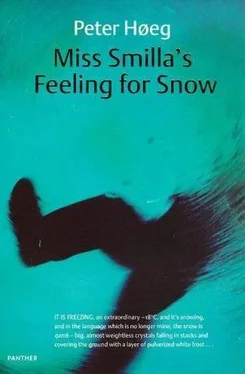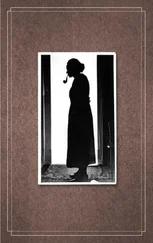Peter Høeg - Smilla's Sense of Snow aka Miss Smilla's Feeling for Snow
Здесь есть возможность читать онлайн «Peter Høeg - Smilla's Sense of Snow aka Miss Smilla's Feeling for Snow» весь текст электронной книги совершенно бесплатно (целиком полную версию без сокращений). В некоторых случаях можно слушать аудио, скачать через торрент в формате fb2 и присутствует краткое содержание. Жанр: Современная проза, на английском языке. Описание произведения, (предисловие) а так же отзывы посетителей доступны на портале библиотеки ЛибКат.
- Название:Smilla's Sense of Snow aka Miss Smilla's Feeling for Snow
- Автор:
- Жанр:
- Год:неизвестен
- ISBN:нет данных
- Рейтинг книги:3 / 5. Голосов: 1
-
Избранное:Добавить в избранное
- Отзывы:
-
Ваша оценка:
- 60
- 1
- 2
- 3
- 4
- 5
Smilla's Sense of Snow aka Miss Smilla's Feeling for Snow: краткое содержание, описание и аннотация
Предлагаем к чтению аннотацию, описание, краткое содержание или предисловие (зависит от того, что написал сам автор книги «Smilla's Sense of Snow aka Miss Smilla's Feeling for Snow»). Если вы не нашли необходимую информацию о книге — напишите в комментариях, мы постараемся отыскать её.
Smilla's Sense of Snow aka Miss Smilla's Feeling for Snow — читать онлайн бесплатно полную книгу (весь текст) целиком
Ниже представлен текст книги, разбитый по страницам. Система сохранения места последней прочитанной страницы, позволяет с удобством читать онлайн бесплатно книгу «Smilla's Sense of Snow aka Miss Smilla's Feeling for Snow», без необходимости каждый раз заново искать на чём Вы остановились. Поставьте закладку, и сможете в любой момент перейти на страницу, на которой закончили чтение.
Интервал:
Закладка:
These pictures are in color. The next one is black and white. It looks as if it's been overexposed.
"These are Isaiah's footprints in the snow," I say.
"Why does it look like that?"
"Because the police don't know how to photograph snow. If you use a flash or lights at more than a 45° angle everything disappears in the glare. It has to be done with Polaroid filters and lights down at the level of the snow."
The next photo shows a woman on a sidewalk. The woman is me, the sidewalk is in front of Elsa Lübing's building. The picture is blurry, taken from a car window-part of the car door blocked the lens.
They were luckier with the mechanic. His hair seems too short, but otherwise it looks like him. There is both a profile and a full-face photo.
"From the service," he says. "They got out the old pictures from when I was in the service."
The last picture is another color photo; it looks like a vacation shot, with sunshine and green palm trees. "Why t-take pictures of us?"
Ravn doesn't take notes and wouldn't need photographs to prod his memory.
"To show around," I say, "to other people."
I put the papers and the tooth and the coins back. I put everything back. Except the last photo. Palm trees beneath an undoubtedly intolerable sun. Humidity guaranteed close to 100 percent. But the man in the photograph is still wearing a shirt and tie under his lab coat. He looks cool and comfortable. The man is Tørk Hviid.
4
I've chosen a tuxedo jacket with wide lapels of green silk. Black pants that go to just below my knees, green stockings, and small green Daisy Duck shoes, and a little velvet fez over my bald spot.
The problem with a woman wearing a tuxedo is always what to wear over it. I have a thin white Burberry raincoat over my shoulders. But I've also told the mechanic that I want to be driven right inside the building.
We drive along Østerbro Street and then along Strand Drive. He's wearing a tux, too. In a different mood I inight have noticed that it's the largest size you can buy off the rack, and thus five sizes too small, and it also looks like something from the Salvation Army and does more harm than good. But we've gotten too close to each other. Even now, squeezed into his tux, he reminds me of a butterfly on his way out of a black cocoon.
He doesn't look in my direction. He looks in the rearview mirror. His driving is still fluid and relaxed. But his eyes are memorizing the cars behind and in front of us.
We turn down Sund Lane, one of the little side roads off Strand Drive, toward the Sound. At one time the road ended at a garden gate leading out to the beach. Now it ends at a high yellow-brick wall and a white crossing gate with a glass booth. A man in uniform takes our passes and pulls up our names on a screen and opens the gate and lets us drive to the next gate, where a woman in a similar uniform accepts 250 kroner apiece and admits us into a parking lot, where we pay an attendant 75 kroner for him to sneer shamelessly at the Morris, which he now takes care of so that we can walk through a revolving door in a marble faqade, up to a cloakroom where we sacrifice another 50 kroner apiece so that a blonde, who carries herself so that we can look right up her nose, will take our coats.
In front of a mirror that covers an entire wall, I repair a little damage with a lipstick, grateful that I used the bathroom at home. At least I won't have to find out how much it costs to pee.
The mechanic stands next to me, gazing at his own reflection as if it belonged to some stranger. We're in the foyer of Casino Øresund, Denmark's twelfth, newest, and most prestigious casino. A place that I've heard about but never expected to set foot in.
This is where Birgo Lander has summoned us, and now he appears. Dressed in white shoes, white trousers with a light blue stripe down the leg, dark blue blazer, gray turtleneck sweater, silk scarf with little embroidered anchors, and a little, white yachting cap. His eyes are glassy, his walk slightly unsteady, and he's as radiant as the sun. With both hands he carefully straightens my white bow tie.
"You look unusually delicious tonight, sweetie."
"You don't look so bad yourself. Is that your Sea Scout uniform?"
He stiffens for a second. Only twelve hours have passed since we last met. But he has already forgotten the sensation.
Then he smiles at the mechanic. "She has a blank check to my heart."
They shake hands, and once again I note the almost imperceptible change in the shipowner. For a moment, while he's holding the mechanic's hand, his drunkenness and his self-styled, meticulously cultivated vulgarity give way to a gratitude bordering on adoration. Then he shows us inside.
I will never learn to be comfortable in ritzy places. With every step I take, I have the feeling that someone might appear at any moment to tell me that I have no right to be here. The mechanic isn't coping much better. He is slinking along several yards behind us, trying to pull his head down between his shoulders. Birgo Lander saunters along as if he owns the place.
"Did you know that I own a piece of the pie, sweetie? Don't you read the papers? Together with Unibank, which financed Marienlyst, and Casino Austria, which runs the casino at the Hotel Scandinavia and the ones in Arhus and Odense. I did it to keep myself from gambling. The owners are never allowed to play in their own casinos. The same is true for the croupiers and the dealers. Austria puts out a book with their photographs, and none of them can gamble at any of the company's other casinos, either."
He leads us through the restaurant. It's a large round room with a dance floor in the middle. In the background there's a long, dimly lit bar. On a raised platform a jazz quartet is playing, soft and anonymous. The tablecloths are pale yellow, the walls cream-colored, the bar stainless steel. All the walls are decorated with rivets, and the door Frames are three feet thick and furnished with bolts. The whole thing is designed to resemble a safe, and it's solid, expensive, and as oppressively cold and alienating as an end-of-the-season dance in a bank vault. Part of one wall lias windows facing the water. You can see the lights of Sweden and the other wing of'the casino with the gamWing rooms, illuminated like glass cages; jutting out into the water. Beneath the windows you can make out the gray ice floes along the frozen shore.
The mechanic falls behind. Lander takes my arm. Past us glide women in decollete gowns and gentlemen in tuxedos, gentlemen in lavender shirts and white dinner jackets, gentlemen in chamois T-shirts with gold Rolex watches and sun-bleached hair.
The room is an oval with a wall of glass, like a black barrier, facing the water. The only light comes from the dim lamps over the gaming tables. There are four curved blackjack tables and two big roulette wheels. A velvet rope hangs between the tables creating an enclosure. Behind it sit three chief croupiers, one at the card games, the others each in a tall chair, one at the end of the French roulette table and one at the American. There is an inspector for every two tables, a croupier at each table.
There is such a crowd of people that you can't see the playing surfaces. The only sound is the soft clicking of the chips being stacked up and the voices of the croupiers.
The gamblers are all men. A few Asian women are sitting at the tables. A few European women are watching without playing. The room is tense with deep concentration. The players' faces are pale in the light, absorbed, enraptured.
Occasionally a figure tears himself away from the table and disappears past us. Several with bowed heads, others with shining eyes, but most of them neutral, preoccupied. Several say hello to Lander; no one notices me.
Читать дальшеИнтервал:
Закладка:
Похожие книги на «Smilla's Sense of Snow aka Miss Smilla's Feeling for Snow»
Представляем Вашему вниманию похожие книги на «Smilla's Sense of Snow aka Miss Smilla's Feeling for Snow» списком для выбора. Мы отобрали схожую по названию и смыслу литературу в надежде предоставить читателям больше вариантов отыскать новые, интересные, ещё непрочитанные произведения.
Обсуждение, отзывы о книге «Smilla's Sense of Snow aka Miss Smilla's Feeling for Snow» и просто собственные мнения читателей. Оставьте ваши комментарии, напишите, что Вы думаете о произведении, его смысле или главных героях. Укажите что конкретно понравилось, а что нет, и почему Вы так считаете.




![Рута Шепетис - Ashes in the Snow [aka Between Shades of Gray]](/books/414915/ruta-shepetis-ashes-in-the-snow-aka-between-shades-thumb.webp)







